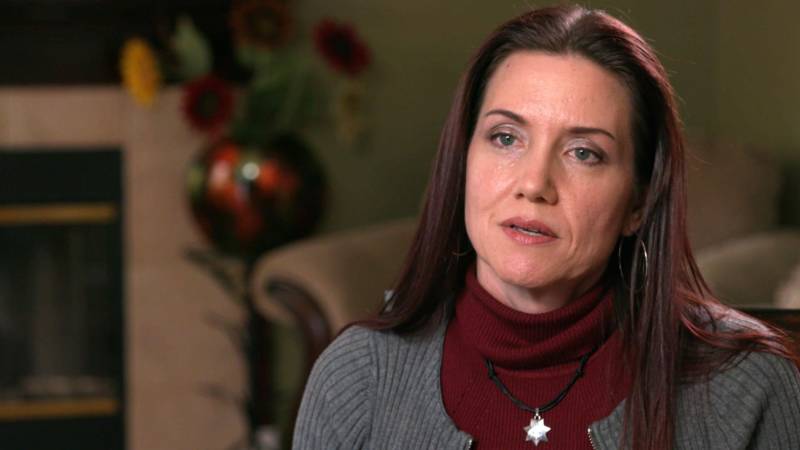Scott Shafer | KQED
In 2005, Dionne Wilson was desperate for revenge. Her husband, Dan Niemi, a San Leandro cop, was shot seven times and killed in an ambush while answering a public disturbance call. The killer was on probation and desperate to avoid going back to prison for having guns and drugs in his possession.
The Alameda County district attorney asked the jury to return a death sentence for the killer, Irving Ramirez. And Wilson wanted it, too.
“I begged for it,” Wilson remembers. “I told them they had to. They have to give me this justice for my children and for my family.”
Wilson got her wish. Ramirez was sentenced to death. But it didn’t have the effect she hoped for.
“That verdict was supposed to be the thing that made me feel better,” Wilson says. “And I felt nothing. All I felt was betrayed, disappointed, let down. I was still full of hatred and anger, and it had nowhere to go. It made it worse. It actually made it worse for me.”
 Dionne Wilson’s husband, Dan Niemi, was shot and killed while on duty as a San Leandro police officer. His killer received the death penalty, but she’s now opposed to capital punishment. (KQED )
Dionne Wilson’s husband, Dan Niemi, was shot and killed while on duty as a San Leandro police officer. His killer received the death penalty, but she’s now opposed to capital punishment. (KQED )
“The whole system is so broken that there really is no repairing it,” Wilson says. “I think what makes the most sense is just to end it. Let’s be smart on crime instead of this tough on crime that has utterly failed.”
Wilson is not your typical crime victim advocate. Most not only want to keep the death penalty, they want to speed up executions with Proposition 66.
Most of California’s 58 district attorneys, including Anne Marie Schubert from Sacramento, oppose Proposition 62. Schubert says the death penalty should be reserved for what many call “the worst of the worst,” whose heinous crimes affected hundreds of victims.
“We’re talking about well over 200 children, 44 or 45 police officers killed in the line of duty,” says Schubert. “We’re talking about women who have been kidnapped, raped and tortured. We’re talking about serial killers, mass killers.”
Schubert says it would be an injustice to their victims if those death sentences are overturned.
If there’s one thing supporters and opponents of capital punishment agree on, it’s that California’s death penalty as it is today doesn’t work. Since California reinstated capital punishment in 1978, about 875 death sentences have been handed down.
Of the 119 deaths among condemned inmates in California, only 13 were the result of a state execution. The vast majority died of natural causes or suicide.
The last execution occurred in 2006. That same year federal Judge Jeremy Fogel put a hold on further executions over concerns about the state’s three-drug protocol for putting inmates to death. More than a decade later, California has still not given final approval to a new procedure. Even before that latest legal delay, the average time between conviction and an execution was about 20 years.
The number of death sentences handed down each year in California has been declining since peaking at 38 in 1999. Last year 14 death sentences were returned, and so far this year there have been only six, including one last month in Alameda County.
Geography matters a lot, too. Los Angeles, California’s largest county, also has given out the most death sentences — 267 since 1978. But a few smaller counties, including Riverside, Kern and San Bernardino, are responsible for a disproportionate number of them.
Number of People Sentenced to Death in California Since 1978
Data from the California Department of Corrections and Rehabilitation (Lisa Pickoff-White/KQED)
Death penalty opponents say capital punishment can’t be fixed and should be scrapped. They argue it’s too expensive, doesn’t deter crime or provide any relief to crime victims’ families. And, they say there’s always the chance legal errors could lead to the execution of an innocent person.
Proposition 62 would replace all existing death sentences with life in prison without the possibility of parole. The inmates would also have to work while behind bars, with some of their wages going to pay restitution to their victims.
The last time a measure to ban capital punishment was on the ballot was 2012, when voters rejected Proposition 34 by 53 to 47 percent. This time around a Field Poll in mid-September showed Proposition 62 leading but still short of the 50 percent needed to pass.
This story is part of our California Counts collaboration with four California public media organizations to cover the 2016 election. The partners include KPCC in Los Angeles, KQED in San Francisco, Capital Public Radio in Sacramento and KPBS in San Diego.
Follow us for more stories like this
CapRadio provides a trusted source of news because of you. As a nonprofit organization, donations from people like you sustain the journalism that allows us to discover stories that are important to our audience. If you believe in what we do and support our mission, please donate today.
Donate Today